|
I've been lucky enough this year to take two trips out of the country (and one hyper-local "stay-cation" for my anniversary organized by my wife). I enjoyed them all and learned many things, including checking off many items from my "do-before-I-die" list. Below are some of my favorite lessons and memories from these travels. (I also just saw Rio, which I really liked, and which reminded me of all the wonderful experiences I had in South America. I'm also reading Surely You're Joking, Mr. Feynman!, and apparently the famous physicist also loved visiting Brazil and even played the frigideira for a winning samba school.) 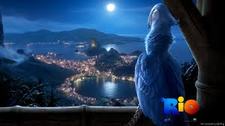 1. Rio is sort of like the movie. The samba is loud (got to see a samba show with good music but slightly cheesy/touristy dancing), the people are crazy about Carnival, and the sights are beautiful. (The movie's Rio is definitely cleaner and has prettier birds, though.) 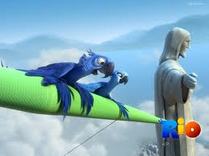 2. The cable car ride up to the Sugarloaf mountain is wild -- such a nice view! 3. The Christ statue at the top of Corcovado is much bigger than it looks. You can take some really fun perspective photos from up there, though. 4. Spanish and Portuguese are close enough. I found Portuguese to be like a melodic version of Spanish; I could get by just turning some ción's into ção's and talking about samba and Carnival (though clearly I'm kidding and there's a lot more to the language). It would definitely be fun to learn it more closely some day.
5. The beaches are beautiful, and they are the spot to be seen during the Christmas holidays. My favorite beach for swimming was in Buzios, a sleepy, less developed part of Brazil (the original home, apparently, of some pirrrrrrates). The busiest beach I've ever seen was in Santos on Christmas Day; it was no less than 10,000 people literally walking up and down the miles-long coastline, sporting their wares (some better than others). It was truly a cultural moment to experience that. 6. Doing tango in a century-old tango studio in Buenos Aires was epic. The creaking wood floor, the raspy Argentine tango record playing in the background with melancholy... it was like I was in a movie. (Having some yummy parilla afterwards is what's required to hit the spot.) 7. Flying is everything I thought it would be. I always dreamed of becoming a commercial airline pilot when I was little, and I got to start towards fulfilling that dream in July. I flew a Cessna from Santa Monica to Point Dume and back with Justice Aviation for a one-hour demo flight (my instructor was named Max too!), and it was truly awesome. 8. Be appreciative for every raspberry you eat; picking them by hand is quite a difficult undertaking. I know: I tried to do it at Underwood Farms, and got so annoyed with it after 20 minutes. Each raspberry has to be picked off by hand, and it has to be ripened just so in order to taste good. I no longer take these little berries for granted. (Another fun thing at Underwood is feeding carrots to the horses and trapeze-artist goats -- no joke!) 9. Biking on July 4th at the beach can be fun and dangerous. We did a bike ride from Venice to Manhattan Beach, which was really enjoyable, except for when the bike path was filled with barbecuing, boombox-toting pedestrians. There was even a section that featured a row of parked Chevy '64s with various "interesting" decorative elements. It was all cool; talk about LA diversity! Other fun stuff from the weekend included seeing the Houdini exhibit (and learning about the history of magic) and eating yummy food at Larchmont Bungalow, Red O, and Geoffrey's. 10. Manatees are the sweetest marine animal weighing close to a ton, and they're in extreme risk of extinction. (Turtles are the sweetest marine animal weighing closer to tens or hundreds of pounds.) I had the pleasure of swimming with (and kissing on the lips!) a manatee, dolphin, and sea lion in Mexico, and it was amazing. Learning about these creatures and watching how smart they can be was really inspiring. It was very sad to learn that 60% of manatee deaths are due to human causes like pollution or plastic bags getting eaten by them and poisoning them (they're dying less from natural deaths than from us!). I also learned manatees don't really have teeth and don't really bite; their color, size, and demeanor reminded me of my previous Neapolitan Mastiff, Marcello. (I also got the chance to swim with stingrays and a nurse shark with apparently no teeth as well -- not sure I believe all these "no teeth" tourist stories, but I'm thankful to have gotten out of there alive.)
0 Comments
There is a well-known Russian saying: "Love is not a potato." The first time I heard this, I thought it was ridiculous. It's like thinking you're smart by stating something completely obvious, like 2 + 2 = 4. However, I've grown to love this saying over time. I love its extremely simple language that can be understood by anyone. I also love that the more you think about it, the more you realize it means. I recently had a long, late-night discussion (with my avid commenter "S") of all the meanings to the saying. Below are what we came up with. 1. "Love" and "potato" are very different objects and concepts. This is the base, "obvious" level of interpretation. 2. You can easily throw away a potato (if it's bad or if you don't like it), but you can't easily throw away love. (This is my mom's interpretation.) 3. Potatoes are easy: skin (optionally) and bake. Love is not easy. It takes a lot of work. 4. Potatoes are pretty much homogeneous. Yes, there are lots of varieties of them, and I'm sure no two potatoes look exactly the same. But my sense is that there are way more varieties/qualities/types of love than potatoes. 5. Potatoes are static. You park one on your kitchen counter, and it will sit for as long as you want. (Yes, it will rot after a while, but that's very slow and gradual.) Love is not static; it is constantly changing and evolving. 6. Potatoes are a staple: a very simple, everyday food item. Love is not a staple; it is unique and celebrated every time it occurs (weddings, anniversaries, Valentine's Day, etc.). More on celebrations later (apparently, people celebrate potatoes too). 7. Potatoes are finite, concrete objects. Love is infinite, a concept. 8. Potatoes have pretty much one dimension. Love has many. 9. Potatoes are easy to mold and fit to your recipe. Love is not easy to mold and takes a lot of care in "harvesting." 10. Potatoes are a side dish. Love is the main course. 11. Potatoes must be salted, or else they're bland. Love is amazing as is. 12. Potatoes have many "eyes." Love is blind. 13. Potatoes have an expiration date. Love (hopefully) does not. 14. You pick the potatoes you eat. Love, more often than not, picks you. 15. Potatoes satisfy the lowest level of your needs on Maslow's hierarchy. Love satisfies needs that are 2 levels higher up the pyramid. 16. You can't make potatoes (nature makes them). You can make love. 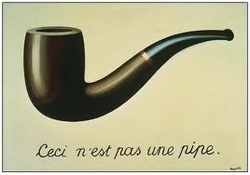 17. Finally, thinking about the saying at a meta/philosophical level, it seems similar to Magritte's image of a pipe. "This is not a pipe," he writes. "Love is not a potato." It is an image of a potato. (?) After coming up with this list, we realized that this was somewhat of a stupid exercise. We wondered what object in fact could be more different from love than a potato.
Thinking about that made us actually realize that love and potatoes, after all, have a lot in common as well: A. People have fought over both: potatoes and love. B. Both can go stale if left untended. C. Both have holidays: potatoes and love. D. Too much of both can be bad. E. Both are best when hot and sizzling. F. You can crush both if you try. G. Both can be enjoyed by many people together (sharing potatoes over a meal, sharing a sense of joint love in a family). What is your interpretation of all this nonsense? I recently finished listening to the book I'm Feeling Lucky: The Confessions of Google Employee Number 59 by Douglas Edwards. It was quite a long, detailed story, but I particularly enjoyed that level of detail, as hearing the "inside story" was what I was actually interested in.
I learned about Google around 2001, when a friend showed me a search engine he claimed worked better (and faster) than Yahoo (that's when they were just showing the milliseconds to complete a query, which they still do to this day). When I got to college, I had friends who worked at the headquarters and even invited me there for meals (it was like going to Disneyland). It was really neat hearing the detailed account in this book from an insider and correlating that with my own personal experiences of the company and people I knew there. The story was written by a journalist who was tired of working at large corporations and wanted to experience the start-up life. He became Google's Brand Manager and continuously struggled with his own identity in the company and what his role was. It was humbling to hear about the internal politics and constant debates that took place between the initial members of the company on issues all over the board, like product features, EULA language, April Fool's jokes, logos, and UI design and copy. I felt like I could relate to the author because I too have experienced these types of debates and have felt similar frustration to his in the past. Overall, I learned a lot more about Google and the bumpy, windy road it took to where it is today. It's so easy to think they had everything figured out from the beginning; this book explains that there could be nothing further from the truth. Below are my main notes and takeaways from each part. Introduction
Ch. 1: From whence you came
Ch. 11: Liftoff
Ch. 17: Two speakers and one voice
Ch. 26: S1 for the money
|
Archives
June 2024
Categories
All
Subscribe |
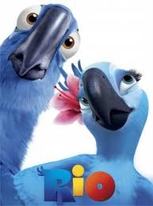
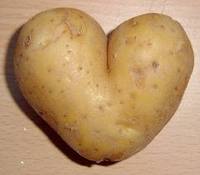
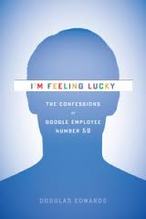
 RSS Feed
RSS Feed
